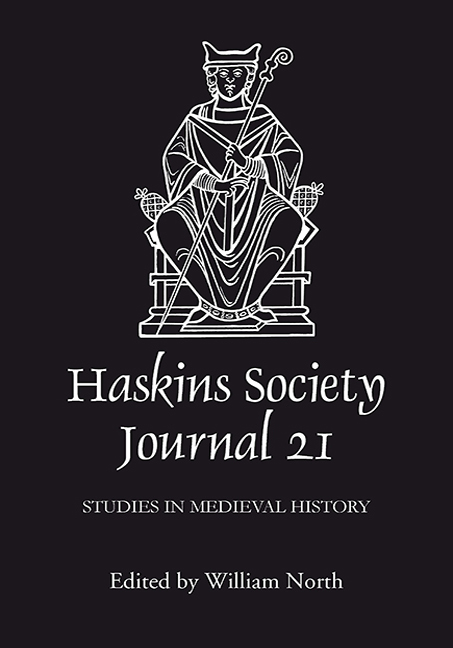Book contents
- Frontmatter
- Contents
- Editor's Note
- Abbreviations
- 1 Bede and the Rewriting of Sanctity
- 2 The Role of Rivers and Coastlines in Shaping Early English History
- 3 Containing Virginity: Sex and Society in Early Medieval England
- 4 Pagans and Infidels, Saracens and Sicilians: Identifying Muslims in the Eleventh-Century Chronicles of Norman Italy
- 5 Robert Curthose and the Norman Episcopate
- 6 The Revival of Roman Law: the Exceptiones Petri
- 7 Mutatis Mutandis: Literary Borrowing from Jerome's Letter to Eustochium and Others in the Life of Blessed Bernard of Tiron by Geoffrey Grossus
- 8 Acting Out Friendship: Signs and Gestures of Aristocratic Male Friendship in the Twelfth Century
- 9 The Quantification of Assarted Land in Mid- and Late Twelfth-Century England
- 10 Origins of Courtliness after 25 Years
7 - Mutatis Mutandis: Literary Borrowing from Jerome's Letter to Eustochium and Others in the Life of Blessed Bernard of Tiron by Geoffrey Grossus
Published online by Cambridge University Press: 28 April 2017
- Frontmatter
- Contents
- Editor's Note
- Abbreviations
- 1 Bede and the Rewriting of Sanctity
- 2 The Role of Rivers and Coastlines in Shaping Early English History
- 3 Containing Virginity: Sex and Society in Early Medieval England
- 4 Pagans and Infidels, Saracens and Sicilians: Identifying Muslims in the Eleventh-Century Chronicles of Norman Italy
- 5 Robert Curthose and the Norman Episcopate
- 6 The Revival of Roman Law: the Exceptiones Petri
- 7 Mutatis Mutandis: Literary Borrowing from Jerome's Letter to Eustochium and Others in the Life of Blessed Bernard of Tiron by Geoffrey Grossus
- 8 Acting Out Friendship: Signs and Gestures of Aristocratic Male Friendship in the Twelfth Century
- 9 The Quantification of Assarted Land in Mid- and Late Twelfth-Century England
- 10 Origins of Courtliness after 25 Years
Summary
In discussions of medieval hagiography, the Life of St Bernard of Tiron by Geoffrey Grossus hardly looms large. Yet, there are some striking literary borrowings in this life that deserve attention in their own right because they shed some new light not only on the ways in which contemporary hagiographers used their literary inheritance to facilitate their own writing but also on another way in which contemporaries were rethinking gender categories as they applied to the religious life.
Bernard was a reformed Benedictine prior, abbot of two monasteries – one wealthy and the other impoverished – a hermit, and a wandering preacher. He was born in the north of modern France, in Abbeville, around 1050. After receiving an advanced secular education, he was drawn to the cloister and traveled south, entering a strict monastery, possibly Chaise-Dieu. Sometime after 1073 Bernard entered the prominent monastery of Saint-Cyprien of Poitiers ruled by Abbot Renaud, formerly claustral prior of Chaise-Dieu. Renaud's appointment as a reformer reflected an incursion by the monastic ethos of Chaise-Dieu into an area of Cluniac influence. Bernard became claustral prior of Saint-Cyprien's large daughter monastery, Saint-Savin, around 1082. Eighteen years later, he was elected abbot of Saint-Cyprien in May 1100 and attended the Council of Poitiers in November. Pope Paschal II promptly subordinated Saint-Cyprien to Cluny and deposed Bernard, who then traveled to Rome to appeal his abbey's takeover but was unsuccessful. At times he took unauthorized absences from the monastic community to live as a hermit in the wilderness ‘deserts’ of the forests of Maine and Brittany. He became associated with the early hermit community at Dompierre near Passais led by Vital of Savigny. When ordered to return to the cloister, he hid on the Chausey Islands in the Channel, where he was beset by phantoms and pirates. He also went on preaching tours in Normandy with Vital and with his close friend Robert of Arbrissel, the founder of Fontevraud. In old age Bernard founded Tiron Abbey southwest of Chartres, in Perche within the county of Blois. Tiron won the support of Henry I of England and Louis VI of France. It became a large congregation and preceded Cîteaux in establishing communities in the British Isles by a decade. Bernard died on 25 April 1116.
- Type
- Chapter
- Information
- The Haskins Society Journal 212009. Studies in Medieval History, pp. 125 - 146Publisher: Boydell & BrewerPrint publication year: 2010



